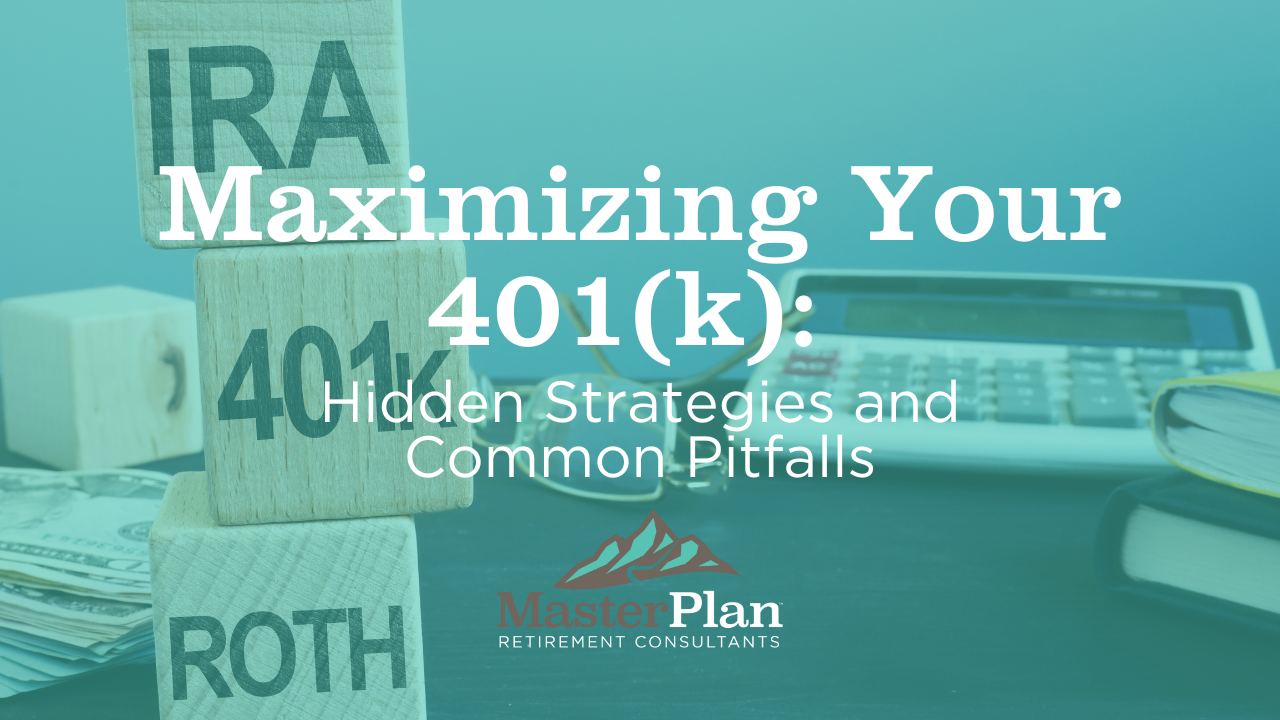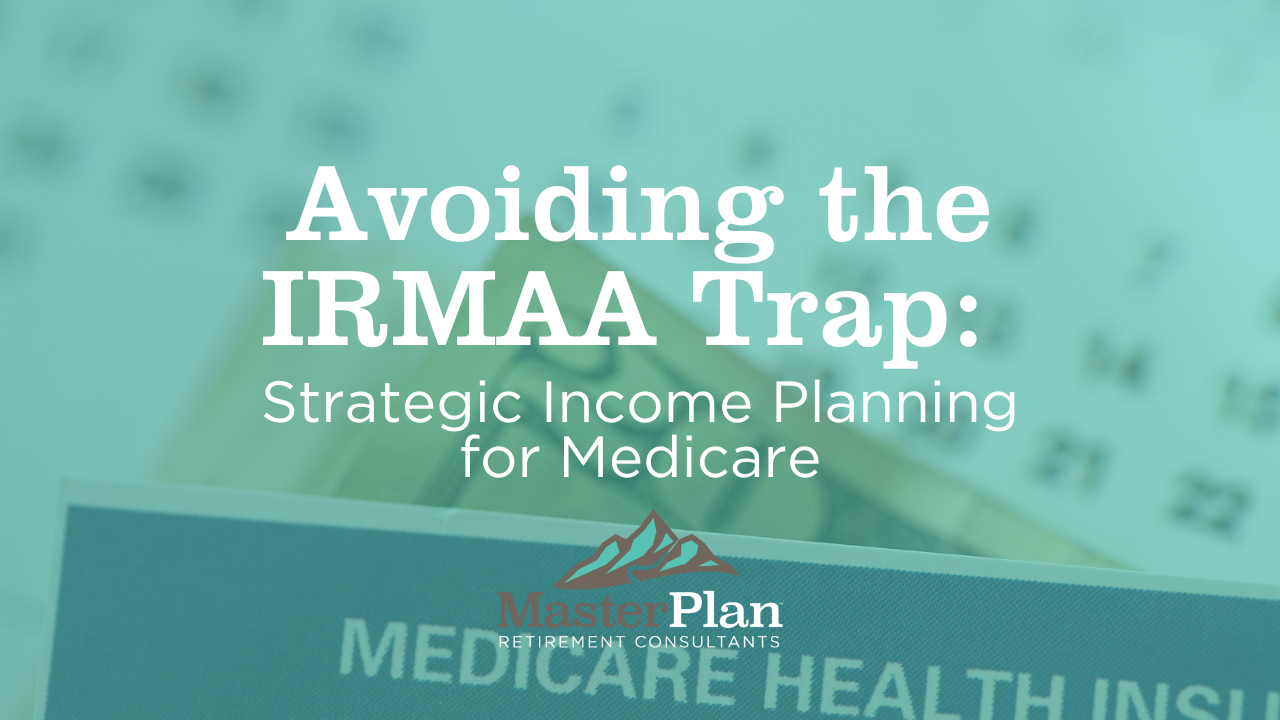Tax Cuts Extended: What the One Big Beautiful Bill Act Means for Retirees
The new federal budget bill makes the 2017 tax cuts permanent, creates a temporary senior deduction, and raises estate exemptions, but also adds $3.4 trillion to national debt while cutting social safety nets. On this episode of Retirement Roadmap, Mark and Evan Fricks explore what these changes mean for retirement planning and identify strategies to maximize the limited window of opportunity created by today's low tax environment.
Evan Fricks:
What does the new budget bill mean for you? Hey folks, welcome back and thank you for joining us. Welcome to Master Plan Retirement Consultants Retirement Roadmap. My name is Evan, with me, as always, retirement planner Mark Fricks. During today's show we're going to discuss what the newly signed federal budget bill may mean for older Americans and retirees and its impact on your retirement tax strategy. There's a lot to get through here, Mark. In fact, we were discussing before this show if we were really going to go through this thoroughly. It's going to take multiple episodes.
Mark Fricks:
Four episodes.
Evan Fricks:
We're going to really try to the first half plow through just a 10,000-foot view of what we'll be discussing and then the second half try to get into more of the details of how that actually can impact retirements.
Mark Fricks:
Yeah, I'm concentrating more on the retiree. There's a lot of different pieces to the bill, as you know, as you just mentioned, but we'll hit most of those in the beginning, like you said, and then let's apply it to you as upcoming retirement or future retirement or current retirement. How it affects that, yeah.
Evan Fricks:
So, number one.
We already know our current debt situation in the United States at $36.2 trillion or something at this point.
Mark Fricks:
That was 20 minutes ago.
Evan Fricks:
That was yesterday, maybe.
So this bill is also introducing more of a debt impact. The bill adds an estimated $3.4 trillion to the national debt over 10 years, with wide-reaching implications for household finances and the broader community. What national debt over 10 years with wide-reaching implications for household finances and the broader community? What does debt have to do with retirement planning? We'll get into that a little bit later, but there's a little bit of a what goes around comes around, kicking the can down the road, so to speak, with this bill.
Mark Fricks:
Bills have to be paid. Government has to pay bills too. They just tend to put them on credit over and over again. That credit credit's getting bigger and bigger. So even though we've got a nice extension which we'll talk about, an unexpected extension of these tax cuts, right, a blessing there, but again it's going to affect us down the road, like Evan said, and we'll look at that a little bit.
Evan Fricks:
We've got some major tax changes. Now there are some calls to praise in this. We've permanently extended the 2017 tax cuts. This does benefit higher earners most, but lower earners may actually lose out on some of this. But nearly 70 tax provisions okay were included, including tax deductions on tips up to 25K, increased child tax credit, new deductions, things like that. But the 2017 tax cuts have now been made permanent, with an asterisk.
Mark Fricks:
That's right. Yeah, nothing's permanent in Washington. I think you may mention this later. But going back to the Kennedy years, it averages every eight to 12 years that cuts have been gone back up again, down, up, down up. So every eight to 12 years is going to be a change, and so this has been extended. But the only I wouldn't call it a guarantee but the only semi guarantee is that's going to go through at least the current administration.
Evan Fricks:
Yeah, absolutely. So, there's a lot of revenue recapture moves to offset the losses. Bill raises the state and local tax salt deduction cap. That was at 10,000. Now it's up to $40,000, but this is temporary, only to 2029, so you can basically choose whether you want to itemize deductions or not. If you do, you have up to $40,000 until 2029 and that goes away. Cuts to Medicaid we are ending green energy tax credits, there's some tariff loopholes that are being closed, just things like that. But there's really a mixed impact by income level. Okay. So the new senior deduction helps modest earners but excludes, like I said, lower income retirees who are already not paying taxes on social security likely.
Mark Fricks:
Yeah, it's hard to lower taxes when folks are not paying taxes. And I'm not saying that's bad, I'm just saying that folks that don't make much money, thankfully, are not paying very much, if any, in taxes. And so you know, when people say, well, you know it doesn't help the people that are in lower brackets, well, we can give them money back, I guess, but you know, at a zero tax rate. So it's a little bit of a political statement when people say that, but it does help a good bit, the middle of America for sure.
Evan Fricks:
Yeah, absolutely. And, like you said, you can't lower taxes if you're already not being taxed on your social security benefits in that sense, but with some of the programs that are being cut, then we do definitely see some of the strain on those lower income folks. But there is a phase out for the higher earners as well. So individuals who are 65 or older by the end of the tax year and have a modified adjusted gross income below certain thresholds Okay. So the deduction amount up to $6,000 deduction for each eligible senior, that's individual, $12,000 for a married couple where both are eligible. This is in addition to those existing standard deductions for seniors and so the phase out is the deduction begins to phase out for those whose incomes are 75k or above and is eliminated entirely at 175k for individuals and that doubles for couples.
Mark Fricks:
Right, right, and the phase out is, like I don't know, six cents per. Yeah, it's a weird formula, but it does phase out the more money you make, which is fair.
Evan Fricks:
And a really key takeaway, because there was a lot of rhetoric on both sides of this leading up to the passing of the bill there's no direct Social Security tax cut.
Mark Fricks:
Right.
Evan Fricks:
People say "why don't you want no taxes on Social Security? Well, you know that comes with a whole other barrel of monkeys to discuss. But this is just a bonus deduction that could help some retirees.
Mark Fricks:
Yeah, if you got rid of the tax on Social Security, you just lost part of the funding of Social Security, so you've killed it that much quicker. So they really couldn't do that. So really they came back door and said well, we'll give you a tax deduction that helps offset maybe some of what you're paying to Social Security, but Social Security taxation on that has not changed.
Evan Fricks:
And this is also temporary- this is till the end of the 2028 tax year, unless again renewed by Congress.
Something else we really need to consider as people planning for retirement or current retirees is the social safety net cuts. The bill includes nearly $1 trillion in cuts to Medicaid, Medicare and the Affordable Care Act. New Medicaid work requirements and stricter eligibility checks could leave 12 million more people uninsured by 2034. Supplemental nutrition assistance programs SNAP as we all know benefits are also being tightened. We'll get into this a little bit later, but really the discussion here is we need to be more self-reliant in retirement and make sure that we've covered all of our bases, but we'll get into the details on that in a bit.
There are weakened consumer protections and loan changes. The Consumer Financial Protection Bureau's budget is cut in half, potentially reducing investigations and refunds, like cracking down on illegal junk fees, tackling discrimination in housing, protecting service members and students from scams. Why do we bring that up? That can directly affect your finances. So we need to be a little bit more vigilant as individuals. It seems in that sense as well. While business tax cuts may boost the economy temporarily, they also come with $3 trillion in additional to national debt. Again, we need to include this debt discussion, because that's going to come up in our conversation later. Major spending includes $1 trillion of defense and immigration enforcement, plus $90 billion for the border wall and detention facilities. And again, we also know with the increase in SNAP we're also losing the temporary increase in SNAP. We're also losing our energy incentives for clean energy, tax credits, things like that. All right, so now the meat and potatoes of the conversation.
Mark Fricks:
If you'd like a transcript of today's show, just email us.
Evan Fricks:
I did all that in one breath. Okay.
So what does it mean for retirees? All right, so we have a colleague in the industry, Becky Swansburg, and she's said this several times the one constant in Washington DC is what, Mark?
Mark Fricks:
Change.
Evan Fricks:
Change, the one constant. Right. So tax rates and standard deduction made permanent. Okay, so for middle America, about 30% lower rates pre-reform from the 90s and the 2000s and now they're permanent. And again, we said that's permanent with an asterisk and government until Congress makes a change, because we know, as you like to say, tax laws are written.
Mark Fricks:
And let's really let's hammer that home really quick. The tax cuts in 2017 were big. It's one of the biggest tax cuts in history of the US Average American less 20 to 30% taxes. So that extension is huge. We've been looking at this date for a long time almost like in disbelief. When a Republican got the White House and the Senate and the House both got Republican, that allowed them to extend that, and so that's a huge part. A lot of negatives in the bill a lot of things that will increase debt and again, maybe it kicks the can down the road that much further, but it does give us a window of things that will increase debt and again, maybe it kicks the can down the road that much further, but it does give us a window of opportunity which we're going to talk about.
Evan Fricks:
There's a really interesting average here. So most permanent tax cuts last between 8 to 12 years. Historically, that's really reasonable when looking at our history. But we are in extremely volatile times and we're seeing the pendulum swing back and forth. Politically, very much so 8 to 12, volatile times and we're seeing the pendulum swing back politically with. Politically very much so eight to twelve. Let's maybe cut that down to eight to ten, or even less these days, we don't know, but we're so, so volatile right now. Okay, so we know we've also got the enhanced senior deductions. All 65 plus individuals have the opportunity for those tax deductions on top of the existing deductions. We we mentioned that earlier 6,000 single, 12,000 for couples, not permanent. 2025 to 2028 tax years, next four years. Why do we bring this up again? Roth conversions will need to be examined closely so you don't lose the extra deduction.
Mark Fricks:
Yeah, because there's an income limit and Roth conversions count toward income and so, just like other areas can be affected, it's not just your federal tax, but it could be tax credits, tax deductions, things of that nature. So you do have to be careful, and if you're working with somebody that doesn't understand this and all of a sudden, in April of the next year, you get this big tax bill from whatever source, which we'll talk about in just a minute that's a big no-no. That's not whether they're not knowledgeable, whether they're not fiduciaries and they just want to do whatever. It's always a good thing to convert, but you've got to use math, you've got to be strategic.
Evan Fricks:
Absolutely and combining that with SNAP as well over the next four years where your deductions might be coming from, trying to build in some Roth conversions leading to retirement at the same time or, in retirement, trying to balance that with Medicare and IRMA. There's a lot to balance here. There already was a lot to balance in retirement, Now there's a couple more layers. Absolutely. Some more good news $30 million estate exemption. So we've raised our estate tax exemption now to $15 million for individuals, $30 million for couples.
Mark Fricks:
That is now permanent with an asterisk high and just folks that may not be familiar with this is you pass away as an individual. Your first 15 million of your estate is estate tax free. After that it begins being taxed and not too many people have that much money that's mostly the very high and wealthy or semi-wealthy right but it can affect you. But I mean just a few years ago it was six million, before that it was three million. So anything above three million you were taxed at 50 percent. So that's a good extension against it. It's permanent until it's changed.
Evan Fricks:
Right. Did the majority of Americans need it that high? That's a different conversation, for sure, but the the risk that we were worried about was it going in the opposite direction and lowering it? Risk that we were worried about was it going in the opposite direction and lowering it? Because we know it was on the table to get to three million. Um, and you know you, even three million might seem like a lot for some people, but when you start adding in life insurance, IRA, 401k,
Mark Fricks:
Your residents...
Evan Fricks:
Your residence...
Mark Fricks:
Your rental house...
Evan Fricks:
Right, you get there real fast, yeah.
So we do want to take a moment, folks, while we're uh plowingowing through this episode, to point you to our website, masterplanretire.com. There you can schedule your complimentary consultation to discuss your own retirement. Have a series of reports ran for you as well. See where you stand. That's masterplanretire.com. Or call us at the office, 770-980-9262.
So the Medicaid and the SNAP cuts these are permanent. Why do we bring these up? We did discuss briefly earlier that our social safety net is starting to be pulled from beneath us. So why does that affect retirees? Well, obviously we need to consider long-term viability of our social safety net structure. In America, funding shortfalls are projected for the Medicare program. Currently we do not have enough revenue coming into the government or being allocated to cover all of the benefits that we owe people. So over the next century, the next 75 years, there's about a $78 trillion shortfall in Medicare and Social Security benefits alone. That's a big number, you think. 75 years, that's going to be our kids' retirement. There's one of two things that the government can do, or they can do both of them, actually, but let's think of the two options. One they can raise taxes or they can reduce benefits.
Mark Fricks:
And from what I've read, you pretty much have to do both.
Evan Fricks:
That's exactly right.
Mark Fricks:
One or the other one, I mean you'd have to raise taxes to the 1940 highest rate, which was 90%. Would we accept that? Probably not, but certainly. And it's not just federal taxes, it's all these little pieces that come together that you know, just like the IRMA or Medicare Part B that goes up every year, but it also increases based on income, and so that's kind of a hidden tax. People don't realize, and so that's just another piece I think will be introduced as we go through time. But I do think, absolutely, as you're hitting, that our kids and grandkids are going to be paying the price.
Evan Fricks:
So we already can anticipate an increase in taxes. I mean, we are at a historically low point in our tax history. There's really nowhere to go but up, especially when we start to dig into our deficit. But let's talk about the benefits. Who are they going to reduce benefits from Savers with more income? So it's critical we want to plan for Medicare and Social Security benefits. We need to include those, but we also want to ensure that we have strategies, income sources and long-term care protection. So if the government decides that folks need to take more responsibility upon themselves, it won't blow up our retirement plans.
Mark Fricks:
Yeah, so many people have so much money in IRA traditional IRA, 401ks, things of that nature and these are just ticking time bombs that, as they continue growing and if your kids inherit that, which hopefully they will they've got to take that money out over 10 years. What's their tax rate going to be? Well, they'll be in their 50s and 60s We've talked about taxes almost assuredly will be higher, and now they're forced to take money out of that inherited IRA along with whatever income level they're at. If they're forced to take money out of that inherited IRA along with whatever income level they're at, well, if they're in their 50s and 60s, they very well could be in their highest income bracket at that point as well, and that has just put a burden on them as well at maybe a rate that could be double what we're at now. So it is so critical. You know one of the stats I picked up here and maybe we're going to share that earlier, but in 2024 tax year we had $4.9 trillion in taxes come into the government.
The programs that are mandatory Social Security, medicare, medicaid the interest on our debt I'm not talking about defense, I'm not talking about any other program Going out was $4.9 trillion. Does that sound familiar? That's exactly what came in, so that doesn't include these things that they have to kind of look at every year like defense spending. Do we want to get rid of our defense Totally? We can't right. And so what about things that are passed in Congress over the year? You know new programs, you know funding more for FEMA because of more disasters, all this kind of stuff, and so there is no way you're going to avoid having a deficit every year which increases the interest payments. I think defense last year was $1.8 trillion.
Evan Fricks:
All of discretionary spending. So exactly Our mandatory spending, which is written in law, was $4.8 or $4.9.
Mark Fricks:
Yeah, so that's exactly what came in, so that doesn't include all the other stuff.
Evan Fricks:
Yeah, that's 1.8 additional, 1.8 trillion additional. Yeah, absolutely so. Do we think we are likely, as a nation, to decrease government revenue or increase government revenue?
Mark Fricks:
Well, again, they're going to have to do both. They're definitely going to increase. And see, you know, a lot of the people in Washington want to add more programs too. So you, you're going to have to have that much more in taxes to catch that up as well. I mean, literally, we taught a class, what was about two months ago, where the debt was 34 trillion yeah. Two months later it's 36 trillion, yeah.
And so this, this is just building upon itself, and you know, I'm not trying to alarm anybody, but we need to wake up and say what can be done today to relieve the burden when taxes do go up. And so, you know, there's a couple of things that I'm sure you're going to talk about, but I do want to kind of pound on this a little bit more. One of the problems is demographics. We have an aging population, more and more people going into Social Security, medicare, maybe Medicaid in many cases as well, so that aging population, fewer people working to pay into Social Security and with the higher income levels to be able to pay into taxes. So they're going to have to tax the seniors more to capture that back right. And then, like we just were talking about the debt and deficits that we'll have to pay more and more interest on as well. So that's two. That's just two things that have combined to come together to just explode the situation. So we're celebrating a little bit today because of the extended tax cuts, but it gives us kind of a window yeah, like we talked about, and the window which you may get into and I hate to step over your outline, but we've got, at least we think, four years to take advantage of the taxes on sale mentality, being careful, because again you get into messing up some deductions, you get into paying more for Medicare Part B, so what is that amount we can convert into some tax-free vehicle.
There's a couple of them out there that we really like to use. Roths are one of them. You pay the taxes as it converts into that Roth or other tax-free vehicle that is currently in an IRA and now it's never going to be taxed again to you, your kids, whoever inherits it. So whatever those rates are, when your kids are inheriting that Roth IRA, no taxes. You also don't have any required minimum distributions on a Roth, so you're not forced to take money out in older age.
And if I'm 65 now and at age 75, taxes go up tremendously. That's the age I had to start taking money out of my IRA. And what if I don't need it? I still take it out, and so that's a taxation as well. So this is the opportunity that we're really promoting today is to work with someone that understands. Not just, hey, I can fill out a form and convert some of my IRA to a Roth, but strategically, so I don't hurt myself too much now. Now there is a pain period too much now. Now there is a pain period. There is some pain now because you are going to be paying more in taxes because you are converting, but not as much as you'll be paying over the next 10, 15, 20 years and your kids will be paying over the next 10 years after that. So really work with someone that understands all of these laws, understands the changes that have taken place and understand the importance of tax-free income in the future and understand how to do it strategically.
Evan Fricks:
Absolutely, and right now, especially when people are looking at okay, we've just gotten these tax cuts extended and made permanent. What are you guys complaining about? Are we still harping on the Roth conversions? Yes, because now is the time to do it. If you are younger and you don't have as much to convert, now is the time to make sure you are allocating younger and you don't have as much to convert. Now is the time to make sure you are allocating your contributions to tax-free vehicles, roths, some of these other vehicles Marcus mentioned before. Folks, like I mentioned before, we're not on a low tax rate forever. Okay, we've got 8 to 12 years, historically on average, before a change in the permanent tax bracket. We're super volatile. Now it could be the end of this term, a presidential term, and again when we spoke about the pendulum back and forth is getting more and more extreme. What's the next?
Mark Fricks:
Yeah, and what Evan means by that too is the fact that in Washington, we have new people in Washington every two years. You know the House is every two years, the White House is every four and the Senate is every six. New people, and the majority changes almost every time in at least one or two of those places, maybe all three, like they did this last time. And so the changes come, and we all know that certain parties want to spend and certain parties want to save. Some of them have kind of merged together, want to do a little bit of both, okay, and so it's got to come from somewhere, otherwise our economy is going to collapse under the weight of the debt, and so this is not necessarily a problem for our children and grandchildren, it's a problem for our country and our economy. And so what happens in four, six or eight years we don't know. We're already with the extension will be eight years into the tax cuts. Right and so.
But help yourself now by getting that money into a tax-free situation and also being better diversified. You know I talk about an economy or going into a recession or whatever because of this debt. Be better diversified for retirement, don't just put all your money in the market and hope for the best, because we know we have a bear market every five years on average, and the average drop is 34%, and so it's not just about taxes. It's also about preserving your money. So when we are designing a portfolio for retirement, we're using multiple portfolios. We're using precious metals, gold and silver which react differently to the market. We use protected accounts that provide income, and so you need to look at it differently than you did over the last 30 years when you were growing. So this is a taxed discussion, but it's also a discussion about being prepared for whatever it could trigger.
Evan Fricks:
Yeah, and I also like when you discuss the political parties, it's not a Democrat or Republican conversation. You know you might be thinking, well, we'll just get another conservative the next year or next year. Elections have impact, but they really only serve to slow or accelerate this path where we can't afford to provide services to the demographic growth that is coming in the future. It's inevitable. It's really not a political problem. A lot of the future spending is just simply a math problem.
Mark Fricks:
It is a math problem and again it's going to take both chopping blocks. You're gonna have to cut programs. Nobody likes that. I mean, you mentioned cutting Medicare. You mentioned cutting Social Security. People are outraged. Of course they are. Well, let's cut defense spending. The world is getting really dangerous. You know it's tough to cut that. So what do you start cutting? Okay, well, you start cutting some of these other programs that's going to affect somebody else, but also, at the same time, they're going to have to raise. Economists tell us you've got to do both. You've got to cut spending and raise taxes. There's no other way around it. And the longer we wait, the more we've got to do with both.
Evan Fricks:
As if we didn't need more complexity to retirement planning. However, folks, if you would like to discuss your own retirement with retirement planning professionals, please do visit our website, masterplanretire.com. There we have conversations about your retirement hopes, dreams, fears, goals and then we run a series of reports, a 10,000-foot view of your own retirement. We put the key in the ignition and see okay, how far does your money go, stress that, test that and then have an opportunity to create your own retirement. We put the key in the ignition and see okay, how far does your money go, stress that, test that and then have an opportunity to create your own retirement plan.
Mark Fricks:
Including the impact of taxes on your future as well. So there's a button, a little green button schedule a meeting. That's complimentary. I hope you do that, but again, I hope today was helpful. A lot of information, we understand what's going on so hopefully you'll come see us. Until then, plan well and prosper. Take care.
This was Retirement Roadmap Radio with Mark Fricks of MasterPlan Retirement Consultants. To schedule a complimentary consultation, go to masterplanretire.com or call 770-980-9262.
All matters discussed during this show are for informational purposes only. Each individual situation may vary and the opinions expressed here may not apply to everyone. Materials presented are believed to be from reliable sources and no representations can be made as to its accuracy. All ideas and information should be discussed in detail with one of our qualified representatives prior to implementation. Advisory services offered by MasterPlan Retirement Consultants a Registered Investment Advisor in the state of Georgia, Mark Fricks and MasterPlan Retirement Consultants are not affiliated with or endorsed by the Social Security Administration or any other government agency.











